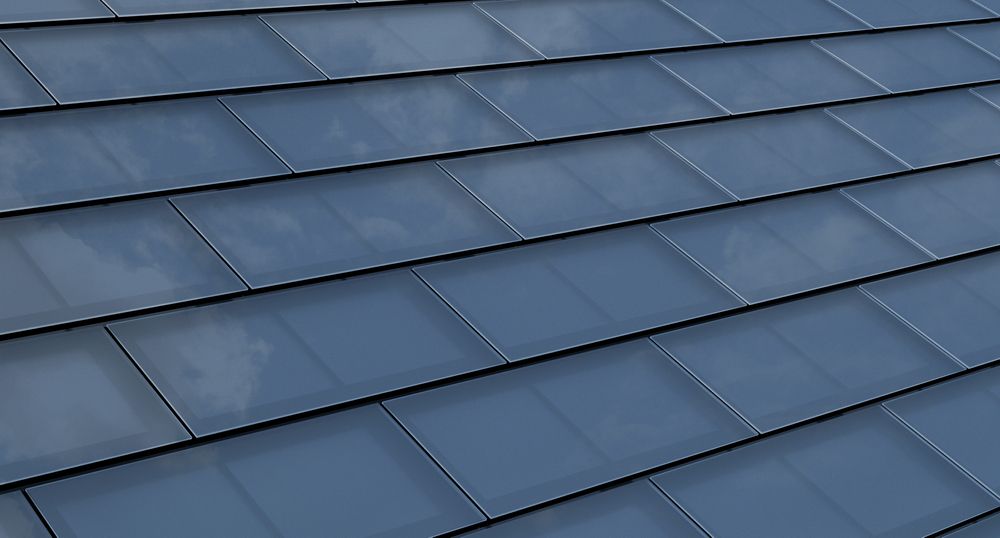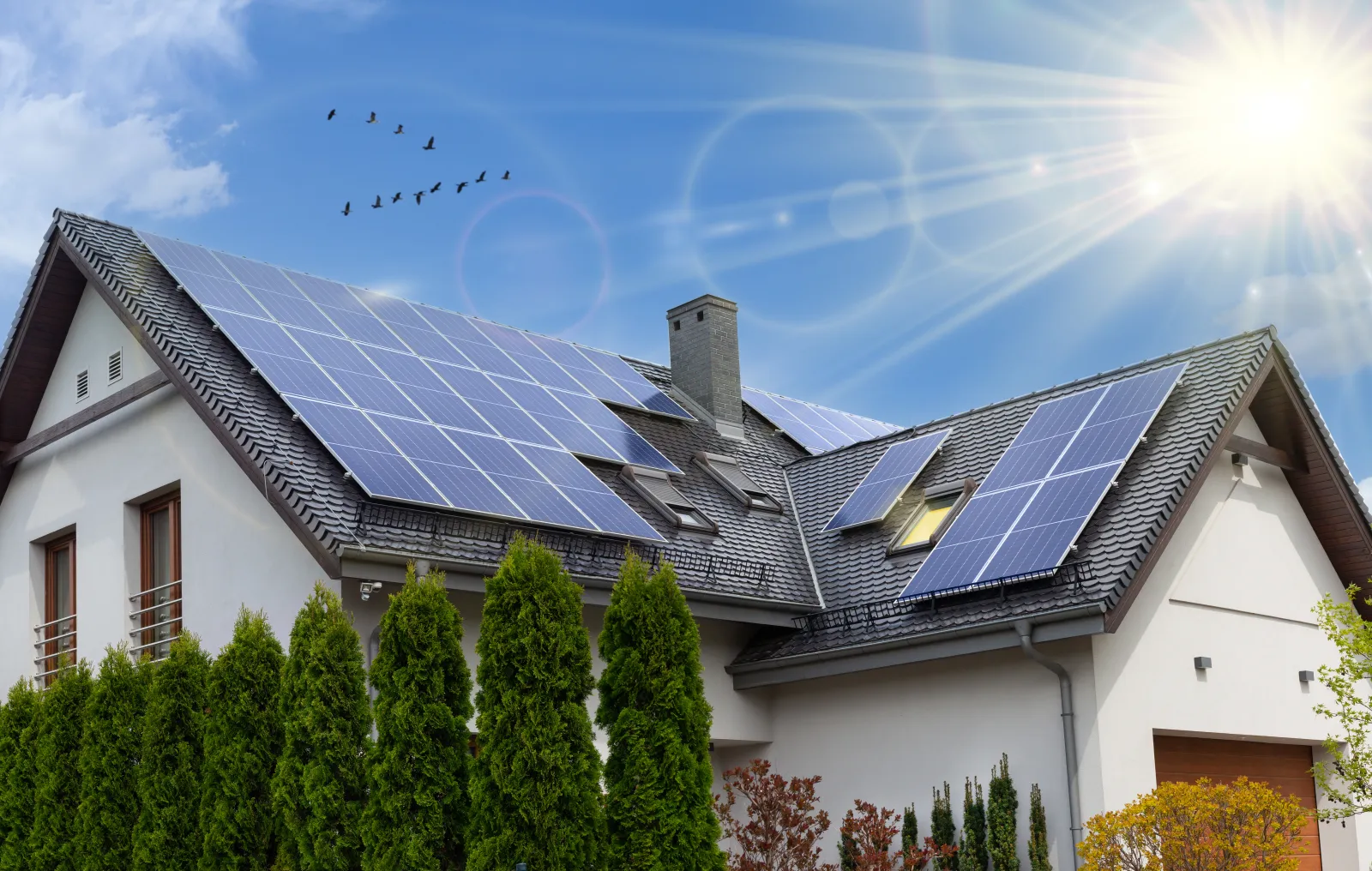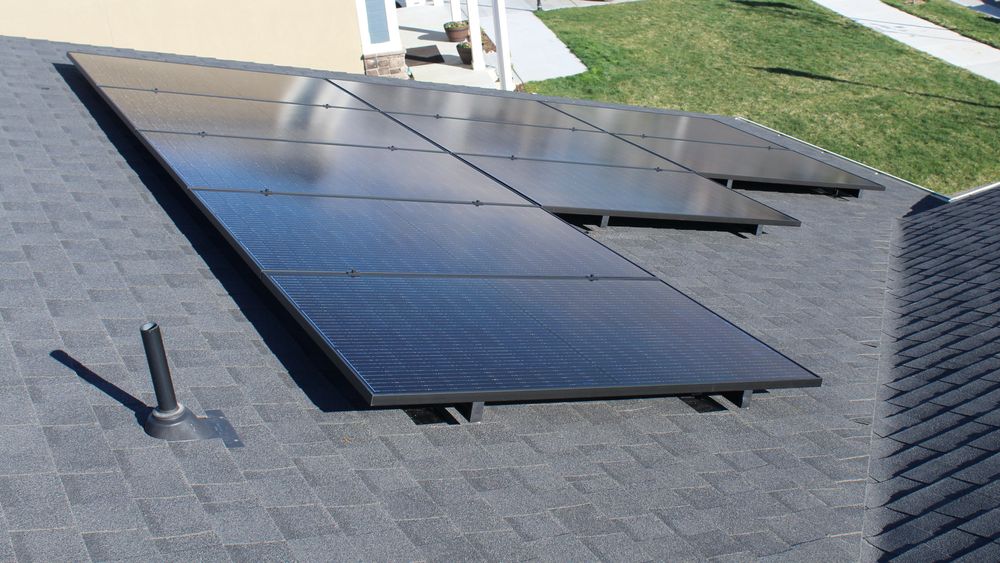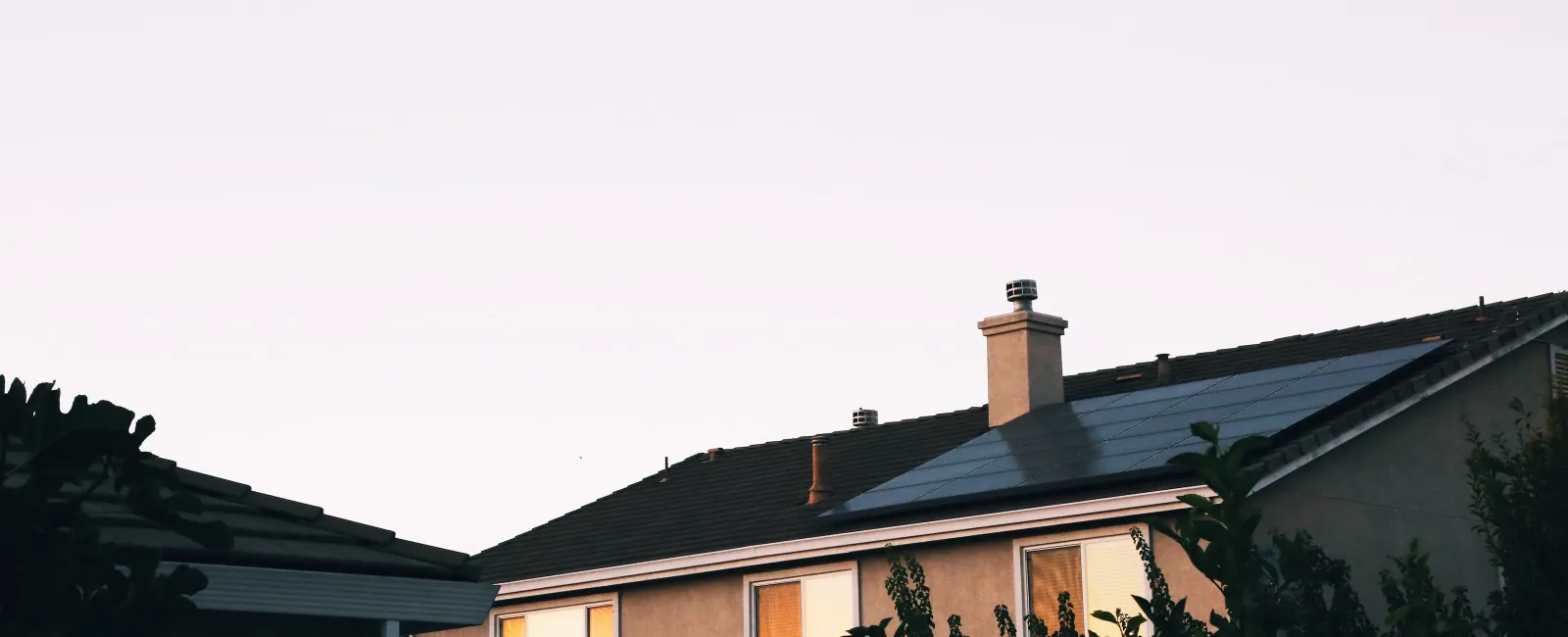The installation of solar shingles and solar panels is one of the most popular home improvement projects for homeowners across the country. Federal and state tax credits and rebates, coupled with lower energy bills and higher home value, make solar installation one of the most financially smart investments you can make in your home.
Read on to compare solar shingles vs solar panels to help decide which option is right for your home.
Get a Free Solar Shingle Estimate
What Are Solar Shingles?
Also known as solar roof tiles, solar shingles are thin photovoltaic panels that absorb the sun's energy and convert it into electricity to power your home. Like traditional roofing materials, solar shingles protect your home from the elements while saving you money on your electricity bill.
If you want to boost your home's sustainability, you can install solar shingles on top of your existing asphalt shingles. If it's time for a roof replacement, you can install a complete solar roof system.
How Do Solar Shingles Work?

When the sun shines on solar shingles, the photovoltaic cells in them absorb the light. These photovoltaic cells sit between layers of semiconducting material like silicon. When hit with sunlight, the material energizes and creates an electric field.
This electric energy comes in the form of a direct current. All solar shingles and solar panels are paired with an inverter, and this inverter converts the direct current into alternating current. Alternating current can be used to power your home, stored in your solar battery bank, or fed back into the national electricity grid.
Pros & Cons of Solar Shingles
Pros:
Solar shingles have a faster installation process
If you need a roof replacement, solar shingles are more cost-effective
Solar shingles are more aesthetically pleasing
Cons:
Shingles are a newer solar technology, so there aren't as many options available
What Are Solar Panels?
Traditional solar panels are a larger version of solar shingles. They are collections of solar cells, also called photovoltaic cells, that harness the sun's rays and convert them into electricity.
How Do Solar Panels Work?
Solar panels work the same way as solar shingles, with an inverter and semiconducting materials like silicon.
How solar power works:
Solar panels convert sunlight into electricity.
Inverter converts electricity to usable power
Converted power is sent to your home.
Excess power is sent to the grid and credited to you.
Pros & Cons of Solar Panels
Pros:
Solar panels can produce more energy than solar shingles
There are plenty of products to choose from
Solar panels are less expensive than solar shingles
Cons:
Solar panels are bulkier and not as aesthetically pleasing as solar shingles
The solar panel installation process is usually longer than the solar shingle installation process
Your roof needs to be in good condition before you can install solar panels
Solar Roof vs Solar Panels
Here are some key things to consider before installing solar on your roof and some main differences between a solar roof vs solar panels.

Limitations
Many homeowners wonder, "Is my house good for solar?" The answer depends on your roof's age, roofing materials, spatial capacity, and pitch.
Solar panels last two to three decades, so if you have an older roof, it may not withstand the lifespan of solar panels. If your roof was installed more than five years ago, you should consider a roof replacement.
Solar panels are most commonly installed on asphalt shingle roofs. Roofs made of wood or clay don't respond well to solar panel installations. It's a good idea to have your roof inspected before you decide to move forward with a solar installation.
The size of your roof will determine how many panels you can install and the power of panels you should invest in. A small roof with vents, dormers, and skylights would benefit from a few smaller, high-efficiency panels that will pull the same amount of energy as a large panel array on a more spacious roof.
An excessively steep roof pitch can make solar panel installation more challenging, and the system will not be able to function at full capacity. Flat roofs may also present challenges and require additional solar panel mounting systems to ensure the panels are angled properly for sun exposure. A roof pitch between 30 and 45 degrees will provide optimal solar panel performance and ease of installation.
Solar Shingles vs Solar Panels: What Are The Differences?
Roof Type
Solar shingles are best suited to new construction projects and roof replacements. Since solar roof tiles cannot be angled toward the sun, they work best on roofs with maximum sun exposure and surface area. Typical solar shingles replace standard asphalt shingles, but tile and wood shingle alternatives are also available.
Solar panels can be mounted onto most roof types and roof materials, including metal, wood, and rubber. They are ideal for existing construction, and the angles can be adjusted to catch the sun for maximum energy efficiency.
Cost
The brand of your solar shingles, your roof type, and the installation affect total costs. Solar shingles cost between $40,000 to $60,000 before the federal tax credit.
Solar panels cost between $15,000 and $26,000. Solar panel installation requires your current roof to be in good condition.
Government Incentives
Solar home upgrades are eligible for a government tax credit. Solar roofs installed between 2020 and 2021 are eligible for a 26% tax credit, while those installed between 2022 and 2032 are eligible for a 30% tax credit.
There is no maximum amount a homeowner can claim, and expenses include:
Solar panels
Contractor labor costs, including permitting fees and inspection costs
Balancing equipment, including wiring, mounting equipment, and inverters
Energy storage devices with a capacity rating of 3 kilowatt hours or greater
Sales tax on expenses
Many states also have their own incentives and rebates on renewable energy. In addition to the opportunity to receive state and federal solar tax credits, solar roofs also save you money on energy bills and boost the value of your home. According to the National Renewable Energy Laboratory, every dollar that a solar panel saves you on your electrical bills increases the value of your home by $20.
You can install solar panels and solar shingles even if you live in a homeowner's association (HOA). HOAs need to approve solar installations, but they are highly likely to do so.

Durability
Solar shingles maintain their energy efficiency for about 25 to 30 years, which is a longer lifespan than traditional asphalt shingles.
Weather and fire-resistant varieties are available. The durability of solar shingles often depends on the manufacturer, and other companies offer their own warranties.
Solar panels last 25 to 30 years at maximum energy production. After this projected lifespan, energy output significantly decreases.
Efficiency & Output
The constricted airflow underneath solar shingles makes them less efficient than traditional solar panels. Most solar tiles produce between 13 to 63 watts of power. A typical installation lowers residential utility bills by 40% to 70%.
Solar panels are more efficient than solar shingles. They can be adjusted to capture the best angle of the sun, and they produce between 250 to 400 watts of power per panel. A standard residential installation lowers energy bills by 90%.
Maintenance & Repairs
Both solar shingles and solar panels are relatively low maintenance. You should get an annual roof inspection and cleaning to ensure they're in good working condition.
You should never use a pressure washer to clean your roof, regardless of its material. Roofs should be washed with a gentle, low-pressure spray and a commercial detergent to remove debris and improve energy efficiency.
Installation
If your roof is in good condition, solar shingle installation can take as little as one week to install over your traditional roofing materials. If you're replacing your roof, solar shingle installation can take two or more weeks to install.
Solar panels can be installed in less than a day.
Elevate Your Home With Solar
If you're ready to boost the value of your home and save money by switching to solar, turn to Northpoint Roofing for leading solar installation in Tennessee and Georgia. Our certified roofing contractors are highly experienced in installing top solar roofing products, including GAF Timberline Solar Shingles.
Take your first step and contact us today.

